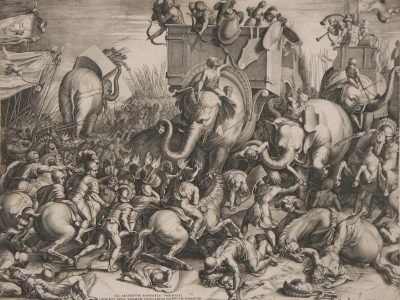Hannibal Barca was a Carthaginian general and statesman widely regarded as one of the greatest military commanders in history. Born in 247 BCE in Carthage (in modern-day Tunisia), Hannibal is best known for his role in the Second Punic War (218-201 BCE) against Rome, during which he achieved several remarkable military feats, the most famous being his crossing of the Alps with a diverse army and war elephants.
Early life and background
Hannibal was born into the prominent Barca family, the son of Hamilcar Barca, a leading Carthaginian general during the First Punic War. From a young age, Hannibal was exposed to the military and the ongoing conflict with Rome. According to legend, he swore an oath of eternal enmity towards Rome at the behest of his father, setting the stage for his future campaigns.
The Second Punic War

Hannibal’s most notable contribution to history was during the Second Punic War. In 218 BCE, he boldly marched his army from Spain, where Carthage had established control over several territories, across the Pyrenees, through Gaul (modern-day France), and over the Alps into Italy. This daring manoeuvre was unprecedented in its ambition and scale. Despite the harsh conditions and significant losses, Hannibal succeeded in bringing his forces into Italy.
Battles in Italy
Once in Italy, Hannibal won a series of stunning victories against Roman forces, including the battles of Trebia, Lake Trasimene, and Cannae. The Battle of Cannae (216 BCE) is particularly notable for Hannibal’s tactical genius, where he encircled and annihilated a much larger Roman army. These victories caused significant Roman casualties and put Rome on the defensive, leading several of Rome’s allies to defect to Carthage.
Strategy and tactics
Hannibal’s military strategy was characterised by his use of surprise, mobility, and his ability to adapt to different environments and situations. He was also known for his ability to understand and exploit his enemies’ weaknesses, using innovative tactics to achieve victory against numerically superior forces.
Later Years and Legacy
Despite his successes in Italy, Hannibal could not secure a decisive victory over Rome. The war’s tide turned when the Roman general Scipio Africanus invaded North Africa, forcing Hannibal to return to Carthage. The two generals met at the Battle of Zama in 202 BCE, where Hannibal was defeated, marking the end of the Second Punic War and establishing Rome’s dominance in the Western Mediterranean.
After the war, Hannibal pursued a career in politics in Carthage, but his reforms aimed at reducing the power of the oligarchy made him enemies. Facing Roman demands for his surrender and internal opposition, he eventually fled Carthage, lived in various Eastern kingdoms, and continued to oppose Rome until his death, likely in 183 or 181 BCE, by suicide to avoid capture by the Romans.
Hannibal’s legacy endures as a master tactician and strategist whose campaigns are studied in military academies around the world to this day. His audacious crossing of the Alps and victories in Italy have made him a legendary figure in military history, symbolising the challenge to Roman power and the brilliance of Carthaginian military leadership.





